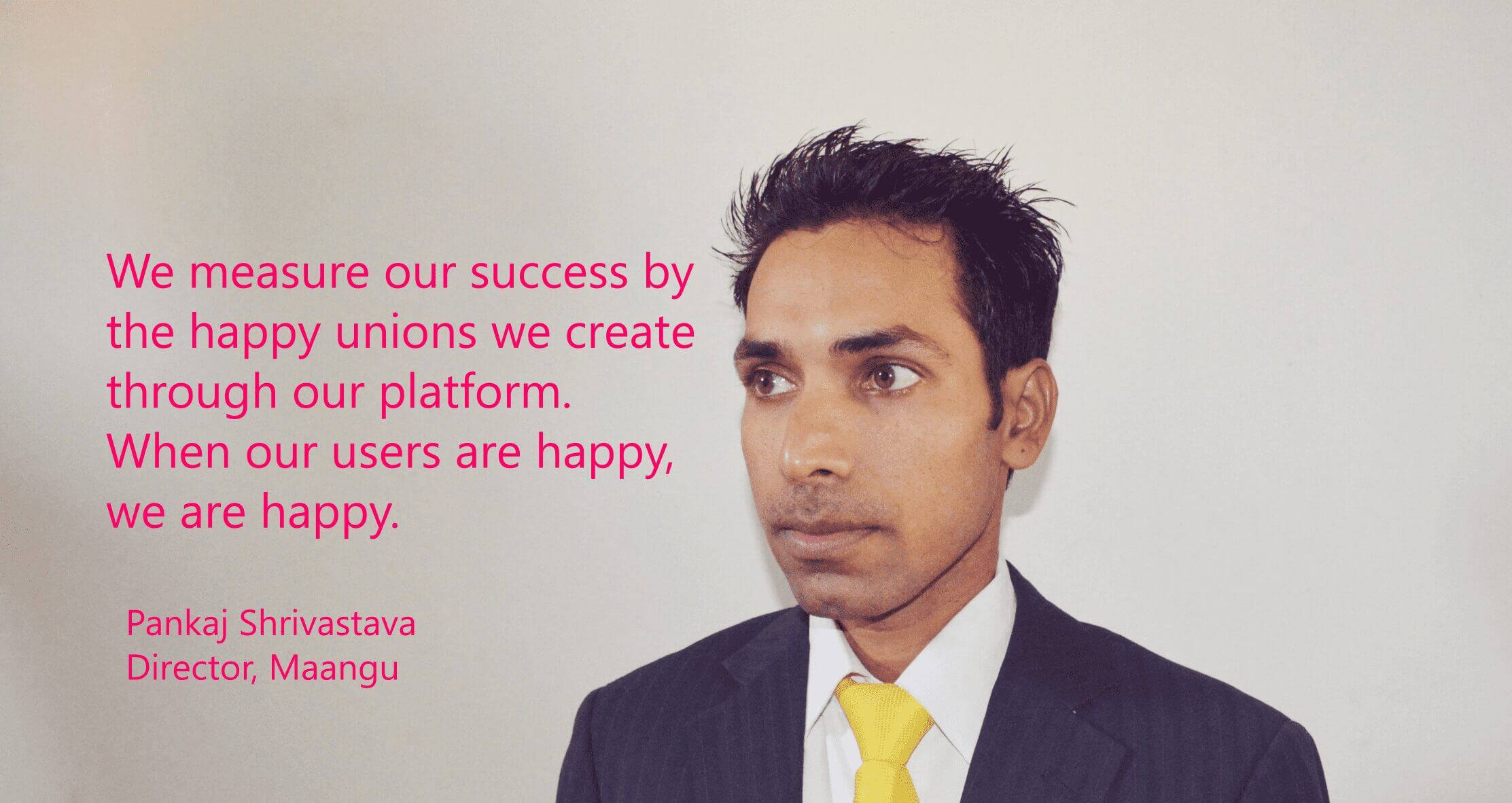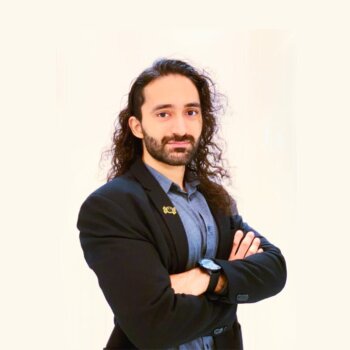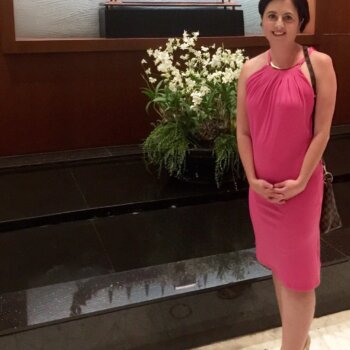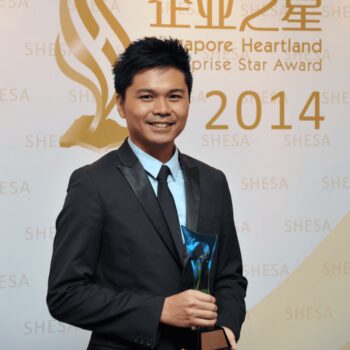Mr. Shrivastava leads the Maangu group and is responsible for Maangu’s overall strategy and operations focusing on driving innovation and positioning Maangu for future growth. In addition to managing the Maangu business, he is also a partner at Johan Hekelaar, an investment banking firm headquartered in Washington, DC where he advises lower middle market companies on M&A transactions. He concurrently is a partner at Uma Ventures Co. where he identifies investment opportunities and oversees portfolio operations. Mr. Shrivastava earned an Advanced Diploma in Business Management from the Western Institute of Technology and a Masters of Commerce degree in Professional Accounting from the Federation University of Australia.
In your own words what is Maangu?
Maangu is the only social matrimony platform where you search, discover and interact with potential partners. It is built on the concept of social dating. Newer generation of Indians want to know more about their would-be life partners rather than the typical information provided by users on “classified style” matrimony portals. Maangu is just right for them.
How did you come up with the idea of Maangu?
Maangu was born because of the frustration that resulted in terrible user experience for premium subscribers in the major matrimony websites. Those platforms penalize the users who pay. Their free users have created the profile and forgotten about it. Worse, their relatives and friends also create profile for them. The premium member gets different responses from people who created that one person’s profile. It’s quite frustrating. In addition, the guys usually “outsource” the asking for dowry part to their sisters or brothers. We hated it. In Maangu, we kick out a member if we find out that he has asked for dowry.
We measure our success by the happy unions we create through our platform. When our users are happy, we are happy. If they have bad experience on Maangu, it’s our failure.
Could you walk us through the process of starting up?
We started by testing the concept of social dating. Indians have historically found matches through their family or friends. The new generation is increasingly taking matters on their own hand. They are deciding who to marry or not marry based on a variety of variables. We also felt that Indian society is not open to the idea of dating yet. We see the shift in three phases: arrange marriages, social dating and then dating. We are in the social dating phase now. As such, we build the product as social matrimony to give users the tools necessary to engage with other members looking to get married. From day one, we have also focused on user’s privacy. User’s privacy is our primary concern. We discourage non serious users from using the website.
Did you encounter any particular difficulties during startup?
We have faced difficulties in every step. You face challenges when you enter into an industry which has been so badly managed. Finding those users who are serious is the hardest part. Somehow the early companies in this space have shifted the burden of paying for their companies on the premium members. We believe that free users are often not serious. They may be there to check out others. They have no commitment. The “not serious” users create a bad experience for the whole community.
How have you been developing Maangu since startup?
We are growing in the right direction. Our only focus is to build a product that meets the needs of our users. Our users are our bosses. We keep them in the centre and develop based on what they like. In addition, we think of ourselves as users. If we do not like something on the website, most likely, users don’t either.
What kind of feedback did you get for Maangu so far?
More than feedback, we felt the idea was validated when i) we received payment from a female user in India, and ii) encouraging comments that we are solving the mess in this industry but also keeping our commitment of anti-dowry startup.
Indian matrimony companies have set a very disturbing practice of showing openly who is looking to get married. Anyone could search for all those profile. They let Google index their profiles. Would you be happy to find out your profile showing in Google search five years after you are married?
Many people visit our website and ask whether they need to pay to see the photo of girls. This is a bad practice set by giants in this industry which they did to gain cheap popularity. Why should a user’s profile be shown to the world who may or may not be serious? We care about user’s privacy. We are committed to the principle of privacy.
What is your strategy against your competition?
There is an intense competition in this industry but the market is so huge that each can exist. We don’t compete with anyone. Our sole focus is on the new generation who want to take the matter in their own hand to find their life partner. Unlike digital matrimony display ads (often in forms of profiles in other websites), we bring life to the search process where people enjoy the process. Finding partner should not be a daunting process. It should be fun.
Tell us about the industry.
Social dating and matrimony industry is growing. It has a noticeable portion of business in any country and will grow over time. The trend of marriage among youngsters is changing continuously. They wish to interact and know each other. Mobile device and internet have been so common at present, and youngsters as well as professionals and non-professionals are seeking help of matrimony sites. Now people want to know more stuff about each other before they make any decision on marriage, so social dating concept was a need.
What is the future of the industry?
The future is bright. People will be looking for bride and groom till eternity. Traditional way of finding partners is fading away. More and more people are getting internet connectivity which is helping to change the way people meet.
Were there anything that disappointed you initially?
We learn something new every day. Rather than getting disappointed, we try to learn from our past actions and go from there.
What do you think about being an entrepreneur in Asia?
As an Entrepreneur in Asia it is harder to grow initially as you don’t have all the systems/technology built that support to function efficiently and effectively. Sometimes it is manpower while sometimes it is technological infrastructure like payment system. Inaccessibility of a larger percent of target market to internet facility is one of the key reasons entrepreneurs in Asia or developing nations find it harder to grow easily and quickly.
We notice that entrepreneurs in Asia are following the western industry model. It’s easy to start and do business in Western countries. In Asia, doing business is difficult. There are trade-off though. In Asia, the market is not much developed so the opportunities are endless. In the West, markets are much more developed and the competition is stiff.
What is your definition of success?
When we plan, execute and get the result as per our expectation, it is success. Success is turning your dreams into reality. When you feel you have achieved what you dreamed for, it is success. There are hurdles at each and every step in your journey when you are an entrepreneur, but never give up and always ready to defeat barriers down and reach to the top of desired outcome.
Why did you decide to become an entrepreneur?
Rather than working from 9 to 5 under someone’s instruction and making them richer, it is much better to work independently, think beyond the sky and turn them into reality. It’s always a better idea to become an entrepreneur, explore opportunities, create jobs and change the world.
In your opinion, what are the keys to entrepreneurial success?
Planning and executing in a positive way is important. Dedication and patience is important in entrepreneurship, as success doesn’t come in days. It needs a good and dedicated team, hard labor and persistence. A positive attitude and a willingness to succeed help an entrepreneur achieve what he has dreamed for.
Any parting words of wisdom for entrepreneurs out there from your personal experience?
Everyone works hard, so I don’t think you should just rely on hard labor to be a successful entrepreneur. Every entrepreneur faces challenges. Try to get rid of you biggest challenges first. Try to learn and know as much as you can about the industry. Analyze the size, target and trend of market and jump in the game. There will be many setbacks in the journey but you should consider them as a part of business.
Connect
Website: www.maangu.com
Linkedin: https://www.linkedin.com/in/pankajshrivastava
Callitme: https://www.callitme.com/shrivastavpankaj
Maangu LinkedIn: https://www.linkedin.com/company/maangu






























